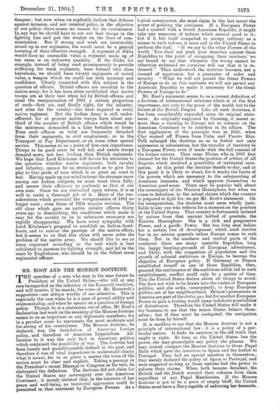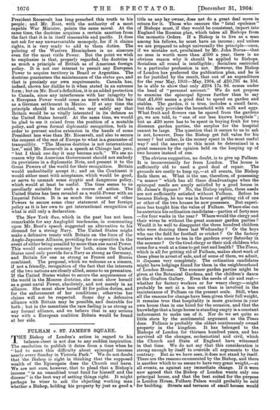T HE speeches of a man who may in the near
future be President of the United States—who will at any rate be regarded as the inheritor of the Roosevelt tradition, and will receive, if he stands, the votes of Mr. Roosevelt's supporters—are always worthy of our attention. This is especially the case when he is a man of proved ability and statesmanship, and when he speaks on a question of foreign policy. Though lie is a statesman out of office, Mr. Root's declaration last week on the meaning of the Monroe doctrine seems to us as important as any diplomatic manifesto, for in a peculiar sense he represents the most moderate and far-seeing of his countrymen. The Monroe doctrine, he declared, was the foundation of American foreign policy, and therefore of American Imperialism. Ad- herence to it was the only fact in American politics which contained the possibility of war. The doctrine had been loosely and grandiloquently defined in the past, and therefore it was of vital importance to understand clearly what it meant, for in so grave a matter the voice of the nation must be clear and explicit. Taking a passage in the President's recent Message to Congress as his text, he elaborated the definition. The doctrine did not claim for the United States any sovereignty over the American Continent; it merely insisted that, in the interests of her peace and well-being, no territorial aggression could be permitted in that continent by European Powers. As a logical consequence, she must claim in the last resort the power of policing the continent. If a. European Power had a quarrel with a South American Republic, it might take any measures of redress which seemed good to it ; but if it felt itself compelled to occupy territory as a means to such redress, it must call in the United States to perform the task. "If we say to the other Powers of the world, 'You shall not push your remedies against these Republics to the point of occupying their territory,' we are bound to say that whenever the wrong cannot be otherwise redressed we ourselves will see that it is re- dressed." Thus understood, the doctrine becomes, not a counsel of aggression, but a guarantee of order and security. "What we will not permit the Great Powers of Europe to do on this continent we will not permit any American Republic to make it necessary for the Great Powers of Europe to do." Mr. Root's statement seems to us a correct definition of a doctrine of international relations which is of the first importance, not only to the peace of the world, but to the future of the British Empire. Like all such doctrines, it has been considerably expanded since its original state- ment. As originally suggested by Canning, it meant nc more than a warning to Europe not to colonise on the American Continent or to interfere in its affairs. The first application of the principle was in 1825, when Clay warned off France from Cuba and Puerto Rico. Polk enlarged the doctrine so as to forbid not only aggression or colonisation, but the transfer of territory to a European Power, even if made with the full consent of the former owners. Then came Blaine, who in 1881 first claimed for the United States the position of arbiter of all disputes which involved a possibility of territorial occu- pation. At this point the doctrine stands to-day, and at this point it is likely to stand, for it marks the limits of the powers which are necessary to the safeguarding of American interests, and which approve themselves to American good sense. There may be popular talk about the sovereignty of the Western Hemisphere, but when we come to definition, to the actual claims which the country is prepared to fight for, we get Mr. Root's statement. On his interpretation, the doctrine must seem wholly justi- fiable to any one who reflects for a moment on the position of the United States. That country is fortunately isolated by nature from that ancient hotbed of quarrels, the Eastern Hemisphere. She is a rich and progressive Power, and a pacific Power. She has long seen before her a certain line of development, which need involve her in no serious quarrels unless Europe comes to seek, them. But in the southern and central parts of the continent there are many unstable Republics, long the happy hunting-grounds of European adventurers, and likely, with the congestion of population and the growth of colonial ambitions in Europe, to become the objective of European policy. If Germany or France established herself in one of these Republics, then, granted the continuance of the ambitions which led to such establishment, conflict could only be a matter of time. This the United States desires above all things to avoid._ She does not wish to be drawn into the vortex of European politics, and she seeks, consequently, to keep European politics out of her neighbourhood. Britain's possessions in America are part of the status quo, but for another European Power to gain a footing would mean indefinite possibilities of disturbance. Therefore the United States will make it her business to see that the minor States behave them- selves • but if they must be castigated, the castigation must be done by herself.
It is needless to say that the Monroe doctrine is not a principle of international law : it is a policy of a par- ticular nation. It finds its sanction in the old truth that might is right. So long as the United States has the power, she may promulgate any policy she pleases. We may, indeed, compare the Monroe doctrine to those Papal Bulls which gave the Americas to Spain and the Indies to Portugal. They had no special sanction in themselves ; they merely declared the policy of Spain or Portugal, and were respected so long as those nations had the power to enforce their claims. When both became decadent, the British and the Dutch wrested their colonies from them regardless of any Papal Manifestoes. If the Monroe doctrine is not to be a piece of empty bluff, the United States must have a Navy capable of enforcing her demands., President Roosevelt has long preached this truth to his people ; and Mr. Root, with the authority of a most capable War Minister, points the same moral. At the same time, the doctrine acquires a certain sanction from the fact that it is in itself reasonable and pacific. It does not ask for any unwarrantable monopoly, for if it claims rights, it is very ready to add to them duties. The policing of the Western Hemisphere is no sinecure even for the most virile Power. But the point we wish to emphasise is that, properly regarded, the doctrine is as much a principle of British as of American foreign policy. It is not our interest to permit any European Power to acquire territory in Brazil or Argentina. The doctrine guarantees the maintenance of the status quo, and that is precisely our own requirements. Canada has, indeed, shown her dislike to it when stated in an extreme form ; but on Mr. Root's definition, it is an added protection to Canada, since any interference with her integrity by a European Power would come as much within the ban as a German settlement in Mexico. If at any time the principle should be attacked, we may safely say that Britain would be as vitally interested in its defence as the United States herself. At the same time, we would be glad to see it raised from the position of a mutable policy, and given formal diplomatic recognition, both in order to prevent undue extension in the hands of some President less wise than Mr. Roosevelt, and also to secure the consent of the rest of Europe to what is a guarantee of tranquillity. "The Monroe doctrine is not international law, said Mr. Roosevelt in a speech at Chicago last year, "but I think one day it may become such." We see no reason why the American Government should not embody its provisions in a diplomatic Note, and present it to the Great Powers of the world for their recognition. Britain would undoubtedly accept it ; and on the Continent it would either meet with acceptance, which would be good, or serve to unmask some cryptic and dangerous policy, which would at least be useful. The time seems to us peculiarly suitable for such a course of action. The United States has been revealed as a world-Power with an Imperial future. It is as much the interest of other Powers to secure some clear statement of her foreign policy as it is her own to get international recognition of what is still only a declaration.
The New York Sun, which in the past has not been remarkable for any Anglophil tendencies, in commenting upon Mr. Root's speech suggested an alternative to his demand for a strong Navy. The United States might make a defensive treaty with Britain on the lines of the Anglo-Japanese Alliance, providing for co-operation in the event of either being assailed by more than one naval Power. This would ensure economy for both, since the United States need only provide for a Navy as strong as Germany, and Britain for one as strong as France and Russia combined. The proposal, which we welcome as a sincere, if not a friendly, recognition of the fact that the interests of the two nations are closely allied, seems to us premature. If the United States wishes to secure the acquiescence of the world in the Monroe doctrine, she must show herself as a great naval Power, absolutely, and not merely in an alliance. She must show herself fit for police duties, and for the enforcement. of her conditions ; otherwise her claims will not be respected. Some day a defensive alliance with Britain may be possible, and desirable for both; but in the meantime the race feeling is as strong as any formal alliance, and we believe that in any serious war with a European coalition Britain would be found at her side.
FULHAM v. ST. JAMES'S SQUARE.



































 Previous page
Previous page